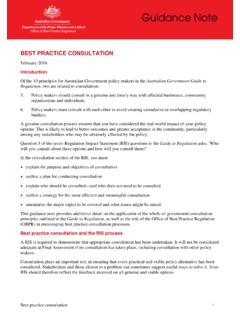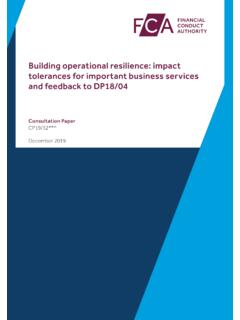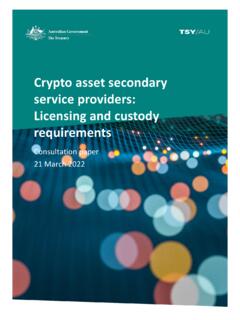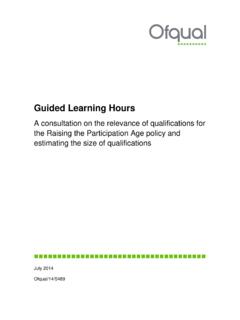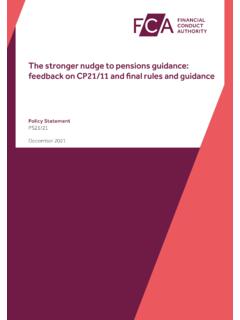Transcription of Children not in school
1 Children not in school Government consultation response February 2022. Contents Foreword 3. Introduction 5. Summary of responses received and the government's response 7. Main findings from the consultation 9. Proposal 1: Duty on local authorities to maintain a register 9. Government response 11. Proposal 2: Duty on parents to register their child 13. Government response 15. Proposal 3: Duty on proprietors to supply information 17. Government response 20. Proposal 4: Duty on local authorities to provide support 23. Government response 25. Other matters 26. Overall proposal 26. Next steps 27. Annex A: List of organisations that responded to the consultation 28. 2. Foreword from the Parliamentary Under Secretary of State for the school System, Baroness Barran It is a cornerstone of our education policy that all young people should receive a world- class education to allow them to reach their potential. For most Children this will take place in school .
2 For some parents, the right choice for their Children is for them to be educated at home, and this is a right that this Government supports. Many parents who educate their Children at home provide a high quality education, and do so in the best interests of their child. It is a demanding commitment for parents to undertake and I. commend those who do it well. The reasons that parents may have for educating their Children at home will vary. For some this will be due to personal circumstances or learning needs, for example mental health, caring responsibilities or special educational needs. For others this may be due to ideological or philosophical views which that they feel would be better promoted through education at home. Whatever the reason, home education works best when it is a positive choice in which the child's education is the primary driver for the decision. However, feedback from local authorities suggests that not all Children educated at home are being educated properly or having their needs met.
3 With local authorities also reporting increasing numbers of Children being home educated, particularly during the Covid-19 pandemic, for reasons other than a commitment to home education, there is a greater need for local authorities to be able to identify these Children to assure themselves about the education being provided. The purpose of the Children Not In school (CNIS) consultation was to gain views on proposals relating to the creation of a local authority administered CNIS register. This would improve local authorities' ability to undertake their safeguarding and educational responsibilities related to Children who do not attend mainstream education institutions. It is also important that parents who make the choice to home educate their Children are supported, to help promote a suitable education. That is why we have consulted on a duty for local authorities to support home educating families. This will change the current system, where local authority support for home educating families is discretionary.
4 The 3. consultation response will reaffirm our commitment for local authorities to provide support to home educating families, should they want it. We consider this consultation response and resulting policy as a valuable means to ensure all Children receive a suitable education, regardless of whether in a school or at home. Therefore, our intended next steps following this consultation response is to legislate to enact the proposals at the earliest opportunity. We will continue to work together with key stakeholders and other government departments to make this happen and develop these proposals into a CNIS register for each local authority and support for home educating families. Thank you to everyone who submitted information to the consultation . Baroness Barran MBE. Parliamentary Under Secretary of State for the school System 4. Introduction Section 7 of the Education Act 1996 places a duty on parents to ensure that their child of compulsory school age receives a suitable, efficient education, either by regular attendance at school or otherwise.
5 This can be fulfilled either by attending a school or by home educating. The Government is committed to maintaining the freedom of parents to provide a suitable education through home education and warmly welcomes the hard work and dedication of those home educating parents who discharge this duty diligently and well. Most Children of compulsory school age in England attend either a state-funded school , or a registered independent school . However, it is known that increasing numbers of Children are receiving their principal education outside of mainstream schools. Most of those Children are being educated at home very well by dedicated parents, who deserve support. However, some are deemed to be home educated' but in reality, such education as they get is mainly or entirely through attendance at unsuitable settings such as unregistered independent schools. There is also a risk that there are a number of Children for whom the education being provided is unsuitable, because their parents are not able to educate them effectively at home, or the Children are simply not being educated.
6 This led to the 2018 call for evidence into Elective Home Education, and the subsequent 2019 consultation , entitled Children Not in school '. The 2019 consultation launched online on 2 April 2019 and ended on 24 June 2019. It sought views on four basic propositions for legislation: a. a duty on local authorities to keep a register of all Children of compulsory school age who are not registered pupils at a state or registered independent school or a Non-Maintained Special school , showing where they are receiving education, whether at home and/or in some other setting;. b. a duty on parents of Children to supply information for such a register;. c. a duty on proprietors of various defined settings to supply information on relevant Children ; and 5. d. a duty on local authorities to provide support to home educating families. A copy of the consultation paper can be found here. The consultation launched following the department's call for evidence on Elective Home Education in 2018.
7 That consultation and call for evidence closed in July 2018 and had two parts: a. consultation on revised versions of the department's guidance on the existing legal basis for the oversight of home education; and b. a call for evidence on the issues of registration, monitoring, and also support for the families of Children educated at home. The first part resulted in the publication of finalised local authority and parents' versions of guidance on 2 April 2019. The second part resulted in the consultation that ran in 2019. The proposals consulted on are responded to below. 6. Summary of responses received and the government's response The Children Not in school ' consultation received almost 5,000 responses, mostly online, and mostly from parents. However a large proportion of local authorities (LAs). responded. There were 145 LA responses, although a few LAs sent in more than one response . The consultation also had significant interest from a number of Children 's charities, who are strongly supportive of the proposals.
8 The responses have been analysed by CFE Consulting, a company chosen by competitive tender, using manual coding for a sample of responses and then software textual analysis. The company's report of the analysis forms the basis of the government response document insofar as that needs to set out factually what respondents said. We have then considered that analysis and drawn conclusions about the ways in which the proposals should be taken forward, having regard to the opinions expressed and in particular, views about the ways in which the proposals could be implemented. This document sets out those conclusions. The home educating parents who responded to the consultation (and who form the majority of respondents) are opposed to the proposals on registration, whereas LAs and Children 's organisations would support them. The picture on the proposed duty to support home educating families is rather more mixed. In total, 4,785 responses to the consultation were received: 4,748 were submitted online.
9 A further 47 were submitted via email in Word or PDF documents or by post: only five of the 47 other responses were structured according to the online survey and were added to the dataset to be included in the quantitative data analysis. Therefore, the final sample comprised of a total of 4,753 for quantitative data analysis. Of the 47 non-standard responses, 10 of these were additional comments by consultees who had already responded to the survey and 1 file could not be opened. Alongside the additional five responses mentioned above, 31 were in no particular structure and subsequently added to the qualitative analysis. Therefore, the final sample was 4,784 for the qualitative data analysis. Further detailed analysis of the responses, including each question asked in the consultation , can be viewed in the accompanying annex, Children Not in school : Annex 7. to the Government consultation response , published alongside this document.
10 The following provides a comprehensive summary of the main findings and government response . Figure 1: consultation respondents by capacity Parents and young people 74%. Other - individual 18%. Local authorities 3%. Third sector organisations 2%. Schools and teachers 1%. Missing 2%. 0% 10% 20% 30% 40% 50% 60% 70% 80%. Base: = 4,753. The department is grateful to all those individuals and organisations that took time to respond to the consultation . 8. Main findings from the consultation Proposal 1: Duty on local authorities to maintain a register The first section of the consultation sought views on the proposal to implement a duty on every local authority in England to maintain a register of all Children of compulsory school age who are not a registered pupil at: a school maintained by a local authority;. a non-maintained special school ;. an alternative provision academy; or a registered independent school 1. Duty on LAs to maintain a register of Children not registered at specific types of school We asked whether LAs should be obliged to maintain a register of Children who are not registered at specified schools.










